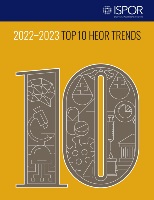
Delivering HEOR Impact in Europe
ISPOR members and the HEOR community develop the field and advance HEOR excellence in Europe.
Case Illustrations
Developing a Model to Support Managing Patients With COVID-19
Summary...
What Was Done?
J. Jaime Caro, PhD, MDCM and team—at the request of the Guy's and St Thomas' National Health Service (NHS) Foundation Trust in the United Kingdom—developed a model to support the management of patients with COVID-19. The model assisted in planning and estimating needed hospital resources, including critical care beds. The simulation modeled actual patient trajectories, was used daily in the first wave of the pandemic, and resulted in capacity estimates for critical care beds.
What Was the Impact?
Based on this vital work, Guy's and St Thomas' was able to expand bed capacity and the model’s predictions were useful for overall COVID-19 preparedness. Since this was implemented, other NHS hospitals have also used this model with several modified versions having been created and are currently in use by other hospital institutions throughout England.
Reference: “Predicting Hospital Resource Use During COVID-19 Surges: A Simple, but Flexible Discretely Integrated Condition Event Simulation of Individual Patient-Hospital Trajectories,” Value in Health, November, 2021, J. Jaime Caro, et. al.[Discretely Integrated Condition Event (DICE) Simulation]
Expanding HEOR to a Digital Therapeutic and Demonstrating Cost Savings
Summary...
What Was Done?
This study examined the cost-effectiveness of a digital therapeutic for treating insomnia symptoms in primary care. The evidence demonstrated that the digital therapeutic was not only effective, but was also associated with a reduction in primary care costs.
What Was the Impact?
This study played a vital role in developing the HEOR evidence to support the guidance from the National Institute for Health and Care Excellence (NICE). It provides an example as to how digital interventions provide new opportunities for ongoing data collection from patients to inform health technology appraisal.Research Informs Clinical Guidelines in the United Kingdom
Summary...
What Was Done?
Research from the University of York has driven national health policy in the United Kingdom for biologic agents used to treat psoriatic arthritis (PsA) and plaque psoriasis (PS). York’s evidence syntheses and economic evaluations of these agents were used to underpin 15 national guidance statements issued by the National Institute for Health and Care Excellence (NICE) since 2014. These resulted in 11 new biologic agents being recommended for use in the National Health Service (NHS) in the United Kingdom.
What Was the Impact?
The subsequent prescriptions have provided patients who have PsA and PS with alleviated pain, improved mobility, functional status, and quality of life. This has generated an estimated 4100 additional quality-adjusted life years (QALYs) for the patients in the United Kingdom during 2014–2020.
Contribute Your HEOR Story of Impact
Share your story of impact with ISPOR. The Society will be sharing some of the case examples submitted to highlight the profound impact that HEOR can have on informing and improving healthcare decisions.

